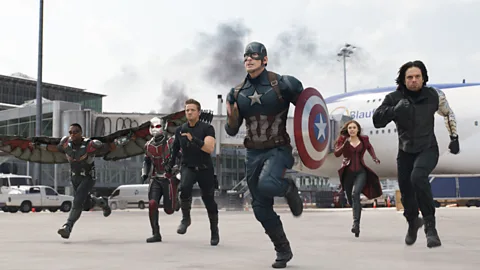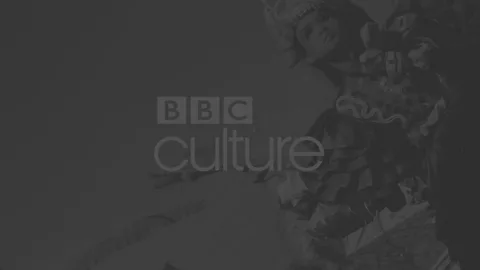Film review: Captain America – Civil War isn’t Marvel-ous
 Marvel Studios
Marvel StudiosThe superhero showdown is drawing raves – but the story has lost its political charge in being translated from page to screen, says critic Nicholas Barber.
The war is over. Marvel’s Captain America: Civil War, the 13th of the interlocking films from the comics publisher-turned movie studio, isn’t just a critical and commercial smash, it’s also being hailed as the pinnacle of the superhero genre. More than that, it’s being trumpeted as Marvel’s ultimate victory over its rival, DC, which has just released its own hero-against-hero smackdown, the widely reviled Batman v Superman: Dawn of Justice. Judging by their respective box office grosses and critics’ ratings, Marvel’s superheroes are soaring higher than ever while DC’s are crashing to earth faster than a speeding bullet. But I’m not sure that Marvel’s triumph is quite as unqualified as that.
ittedly, I liked Dawn of Justice, which may disqualify me from any reasonable discussion of the matter. But however much you may despise DC’s film, it clearly had ambitions to be a challenging, idiosyncratic exploration of how terrifying it would be to share a planet with an omnipotent alien being. However much you love Civil War, on the other hand, its only ambition is to be a bright, shiny link in the chain between the last Marvel film and the next one. It fulfils that ambition in style.
The people behind Captain America: The Winter Soldier – directors Anthony and Joe Russo, and screenwriters Christopher Markus and Stephen McFeely – have succeeded in constructing an engaging, just-about-coherent global thriller, which is no small feat, given that they had to marshal a soap opera’s worth of characters, choreograph a series of acrobatic fight scenes, refer back to a dozen previous films, and lay the groundwork for several more. But while you have to ire the professionalism and panache with which they’ve ticked all the boxes on their to-do list, you may also wish that they had been allowed to try something bolder.

Civil War opens with a sequence modelled on the pre-credits set pieces in Daniel Craig’s Bond movies. Cap (Chris Evans) and his various sidekicks are on a stake-out in Lagos, Nigeria, where they hope to catch some superpowered terrorist group or other. Naturally, chaos ensues, and when Scarlet Witch (Elizabeth Olsen) uses her telekinesis to fling a bomb away from Cap, the explosion kills several civilians instead. They’re hardly the first innocent bystanders to be killed during the course of a super-skirmish, either. The world’s leaders have a conference – apparently without the knowledge of the Avengers – and draft a new doorstop-sized agreement called the Sokovia Accords. From now on, it decrees, superheroes cannot zoom into combat until they are given the go-ahead by a United Nations committee.
Men in tights
It’s an intelligent idea, although if the Marvel Cinematic Universe is a reality in which the Avengers are held able for their actions, it’s surely fair to ask why the Scarlet Witch hasn’t been arrested already for aiding and abetting Ultron in their last film, and why, for that matter, Iron Man/Tony Stark (Robert Downey Jr) isn’t serving a life sentence for creating the genocidal robot in the first place.
Never mind. When the US Secretary of State, Thaddeus Ross (William Hurt), informs the Avengers of the Accords – and it’s more accurate to call Civil War an Avengers film than a Captain America one – the gang is split conveniently down the middle into those who are willing to accept the deal, and those who are determined that they remain independent. On the pro-Accords side, there’s Iron Man, Black Widow (Scarlett Johansson), War Machine (Don Cheadle), The Vision (Paul Bettany) and their new friend the Black Panther (Chadwick Boseman). On the rebels’ side, there’s Captain America, the Falcon (Anthony Mackie), Scarlet Witch, Hawkeye (Jeremy Renner), and Cap’s old buddy, the Winter Soldier (Sebastian Stan).
The superheroes are divided along much the same lines as they were in the Civil War comics that inspired the film. But in the context of the Marvel Cinematic Universe, their allegiances don’t make much sense. Why would Captain America object to taking Government orders when he is an officer in the US Army? And why would Tony Stark cede his authority to politicians when he has spent so many films keeping his technology out of their hands? Markus and McFeely’s brisk dialogue may disguise the arbitrary nature of the characters’ decisions, but there is no cogent reason for any of them to be on one side or the other, which is why their inevitable dust-up feels like a game of dodgeball in a school playground: essentially, Cap and Iron Man have taken turns to pick the players they want on their teams. Even while everyone is fighting, it’s impossible to who is allied with whom, or why.
From pulp to pop
That’s one difference between Civil War and Dawn of Justice. In DC’s film, you can believe that Batman and Superman loathe each other. There is also the intriguing suggestion that, in Batman’s fevered mind, his one meaningful contribution to humanity might be to eliminate the dangerous extra-terrestrial in our midst. But the schoolyard scuffle in Civil War doesn’t have any of that viciousness or life-or-death urgency. It’s all a bit of a lark, with the characters joking and apologising as they punch one another. And any doubts about how inconsequential it is are dispelled even before hostilities begin, when Ross tells Stark that he has 36 hours to bring in a fugitive Captain America.
Despite this tight deadline, Stark somehow finds the time to recruit a teenage Spider-Man (Tom Holland, charmingly nerdy), chat up his aunt (Marisa Tomei), and design and manufacture a costume for him. It’s an ission that the film-makers aren’t really serious about their characters’ agendas. What they’re serious about is introducing the Black Panther and a rebooted Spider-Man in time for their own headlining movies.
Still, it’s this levity that makes the much-touted battle royale between Team Cap and Team Iron Man so much fun. You have to ignore the fact that the team with an indestructible android and two suits of flying armour would, logically, make mincemeat out of the one comprising some tough guys with a shield and a bow and arrow, but this sequence isn’t about logic. It’s about the delight the film-makers take in imagining what their characters can do. It’s about moving superheroes away from grim'n’gritty brooding and back to knockabout stunts and irreverent banter. It’s also the most enjoyable fight scene of any superhero movie.
This colourful, crowd-pleasing spectacle is the stuff of fanboys’ dreams, and it’s enough in itself to justify the film’s existence. But considering that Civil War opens with so many civilian casualties, followed by a debate about those classic Marvel themes, great power and great responsibility, it also feels like a cop-out. The Civil War arc in Marvel’s comics encomed a multi-issue discourse on security and freedom. In the film, all political and philosophical questions are steadily pushed aside to make way for the bromance between Cap and the Winter Soldier, some nonsensical scheming by a criminal mastermind called Zemo (Daniel Brühl), and a breezy play-fight on a deserted airfield (so there’s no need even to think about collateral damage). It’s disappointing that Civil War should start as an analysis of American interventionism, only to end as a grudge match between super-colleagues, but maybe that s for the film’s subtitle. As wars go, it’s certainly a civil one.
★★★☆☆
If you would like to comment on this story or anything else you have seen on BBC Culture, head over to our Facebook page or message us on Twitter.
And if you liked this story, sign up for the weekly bbc.com features newsletter, called “If You Only Read 6 Things This Week”. A handpicked selection of stories from BBC Future, Earth, Culture, Capital, Travel and Autos, delivered to your inbox every Friday.
